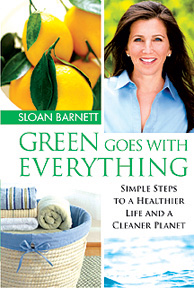Green Goes with Everything: Simple Steps to a Healthier Life and a Cleaner Planet by Sloan Barnett (Atria Books).

Sloan Barnett begins Green Goes with Everything powerfully, with the story of her three-year-old son's life-threatening asthma and her discovery that environmental chemicals were most likely causing it. A law school graduate and former New York Daily News consumer-affairs reporter, Barnett responded to her son's illness by turning to environmental activism; she's now green editor at KNTV, San Francisco's NBC affiliate, and a regular Today show contributor. She writes with a mother bear's passion, which is both a strength and a weakness of her book. In chapters on cleansers, food, water, and baby care, she gives the information you need to start reducing your exposure to many of the toxic chemicals in your life and, more importantly, your children's lives. Her discussion of the ingredients in such commonly used products as diaper creams—and the simple alternatives that will allow you to eliminate them from your baby's life—is both eye-opening and inspiring.
Sometimes, though, Barnett's zeal gets in her way. She bases her book on the precautionary principle that we should assume a chemical is harmful unless it's been proven safe. Green Goes with Everything would be stronger if it had included a short primer on why we should be concerned about the chemicals we encounter daily, as well as a practical guide to reducing our exposure.
A further concern is Barnett's enthusiastic endorsement of the Get Clean product line manufactured by Shaklee Corporation. Her husband, Roger Barnett, is Shaklee's chairman and CEO, so this hardly qualifies as a dispassionate assessment. Without third-party auditing, there is no way to know if her claims about Shaklee's products are valid.
Still, readers who are not already familiar with the dangers of household contaminants should heed Barnett's message: many common products we bring into our houses may indeed be dangerous. And adding to the urgency of her message is our increasing understanding of epigenetics, the ways gene expression is altered and passed on without a change in DNA. Epigenetics suggests that our exposure to synthetic chemicals may harm unborn generations. The latest science tells us to listen to Barnett: the risks are too great to endanger our kids.
Ittleson Associate Professor of Environmental Studies Steven Hamburg is on leave, working at the Environmental Defense Fund.






